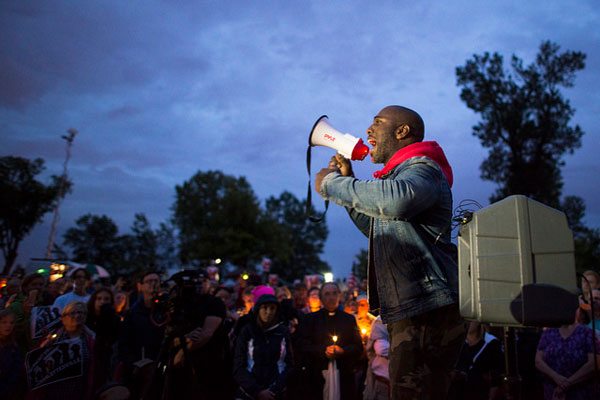
The white supremacist “Unite the Right” rally in Charlottesville, Virginia over the weekend began and ended with the kind of racial violence that should be impossible for people of the United States and any organizations based on or supportive of the basic principles of human rights, justice, and equality to tolerate.
Starting with a torchlight march replete with chants of “White Lives Matter,” “You will not replace us,” “Jews will not replace us,” and open Nazi iconography, it progressed through the next day when a young man horrifically launched his car into a crowd of Black Lives Matter counterprotesters, killing one young woman and injuring many others.
The Southern Poverty Law Center, a nonprofit that monitors and exposes hate groups, states on its website, “White Lives Matter, a racist response to the civil rights movement Black Lives Matter, is a neo-Nazi group that is growing into a movement as more and more white supremacist groups take up its slogans and tactics.”
Following the violence, which did not end there, President Trump issued a statement so equivocal it stood out as clear refusal to condemn openly and violently racist ideologies. It attributed the “hatred, bigotry and violence” to “many sides” instead of making the point that white supremacy has no place in American society.
The Washington Post wrote that “numerous Republicans and Democrats have criticized the usually blunt-speaking president for reacting to the violence and racism in Charlottesville in such vague terms, for placing equal blame on the counterprotesters and for not specifically condemning the white supremacists involved.”
Of course, why would one expect anything different? White supremacy—the so-called “alt-right”—has been welcome in Trump’s administration and among parts of his base. In fact, some clearly expected even more support from the president, who has positioned himself to attract the support of white supremacists while declaring he is “the least racist person…you’ve ever seen.”
“I recommend you take a good look in the mirror and remember that it was White Americans who put you in the presidency and not radical leftists,” said David Duke of the KKK in response to Trump’s statement. Duke had earlier remarked that the Unite the Right rally was “going to fulfil the promises of Donald Trump. That’s what we believed in. That’s why we voted for Donald Trump, because he said he’s going to take our country back.”
Sign up for our free newsletters
Subscribe to NPQ's newsletters to have our top stories delivered directly to your inbox.
By signing up, you agree to our privacy policy and terms of use, and to receive messages from NPQ and our partners.
Other politicians had no such struggles declaring their stands. Governor Terry McAuliffe of Virginia had a clear message for “all the white supremacists and Nazis who came into Charlottesville today. Go home. You are not wanted in this great Commonwealth.”
We could have used a strong statement like that from the White House. Instead, Trump refused to answer when a reporter asked him if he wanted the support of white nationalists. Indeed, many Unite the Right demonstrators wore the “Make America Great Again” hats the Trump campaign popularized.
“I think what you saw here was a real moment in our nation for our leaders to deal with this moral issue as one country, as people all over the world watched,” Gov. McAuliffe said. “Mr. Trump’s words were not—not— what this nation needs. I do think it’s the president’s responsibility to take leadership on this. It’s what any American would do. Now is the time to step up.”
Jelani Cobb, writing for the New Yorker, sees a moment in which America must declare itself:
The sickening images that emerged from Charlottesville herald that some moment has arrived. It is a moment of indeterminate morality, one in which the centrifugal forces of contempt, resentment, and racial superiority are pitted against the ideal of common humanity and the possibility of a civic society. We have entered a new phase of the Trump era. The breach that Trump has courted since he first emerged in public life has become apparent; it is more deadly and its architects more emboldened. What happened in Virginia was not the culminating battle of this conflict. It’s likely a tragic preface to more of the same.
Nonprofits should understand that this moment defines us on a deep level—a moment where civil society must declare with moral certainty that notions of racial superiority are antithetical to our common humanity and our future. As a sector, we have not taken the leadership on this that we should. In fact, our organizations often mirror the distortions of larger society. Not only must we publicly disavow white supremacy; we must offer a counter narrative, and model leadership that supports racial justice and economic justice—in society at large and in our organizations. We have no time to waste.










